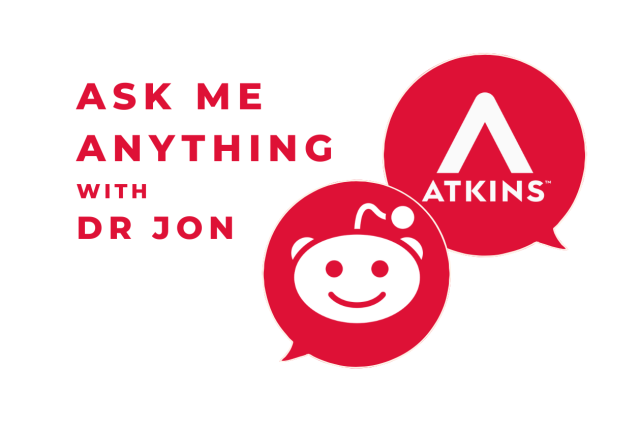
A roundup of a lively discussion on Reddit about nutrition and Atkins’ low carb lifestyle.
During an engaging Ask Me Anything (AMA) session on Reddit, Atkins’ Senior Director of Nutrition and Scientific Affairs, Dr. Jon, invited the community to ask any question on nutrition and all things low carb—and they did not hold back. The AMA sparked a lively and insightful exchange, from discussions on GLP-1 weight loss meds and their impact on eating habits to detailed analyses of ingredients in Atkins products. Drawing on his extensive research, Dr. Jon gave thoughtful and thorough answers that sparked conversations about “hacking your health.” Here are some of the highlights:
Low-Carb Benefits and Considerations: The discussion addressed why low-carb diets can improve cholesterol and triglyceride levels through metabolic changes. However, adherence and “carb creep” (reintroducing too many carbs) can pose challenges. Dr. Jon also noted that some individuals experience LDL increases on keto and may need tailored approaches.
Q: What is it about a low carbohydrate, high-fat diet that improves cholesterol and triglyceride levels when we’ve been told for decades that this nutrition plan will cause heart disease?
Dr. Jon: Cholesterol levels improve because of the fundamental change in metabolism, the liver is handling lipids differently. it’s really important to understand that when you restrict carbohydrates sufficiently, you have dramatic shifts in the way metabolism works. You more or less shut down the creation of fat from carbohydrates (known as de novo lipogenesis) by the liver which drives down triglycerides significantly. In fact, reduced triglycerides are probably the number one indicator of someone actually adhering to a lower-carb approach. There also are changes in how lipoprotein metabolism works, with the reduction in triglycerides VLDL then goes down, so you have less creation of small dense LDL remnants. It is really important to understand that when metabolism is working this way, public health-style epidemiological research is not able to give an accurate assessment. Jeff Volek and others have done some amazing randomized controlled trials looking at these metabolic shifts and how this then influences cardiovascular risk profiles as well as the types of fats in the blood. When you review these studies, it becomes clear that there should be different risk profiles applied for people on high-carb diets vs those on low-carb diets.
A Low Carb Diet’s Role in Heart Health
The Role of GLP-1 Medications:
Dr. Jon explained how GLP-1 medications reduce cravings and support calorie reduction. He recommended high-protein, high-fiber diets for satiety when transitioning off these medications.
Q: I’ve been taking GLP-1 medications for seven months, and I and have lost 30+ pounds. I’ve got maybe 10 pounds to go. I’m concerned about food noise and cravings returning once I stop the medication. Is there anything I can do to prevent it?
Dr. Jon: Congratulations on your success. I think there is a huge opportunity to build good habits when using the medications so that you have these habits in place if you choose to stop using the medications. Also, getting back to the basics with meal prepping, staying well hydrated, and getting lots of sleep. The best nutrients to leverage for satiety are going to be fiber and protein, so hypothetically, when you want to increase satiety, large doses of protein can be really helpful.
Atkins and Weight Loss Medications: Before, During and After
What To Eat While Taking GLP-1 Weight Loss Medications
Low Carb Lifestyle Strategies:
Dr. Jon answered questions about the best ways to succeed on a low carb lifestyle.
Q: What rare low carb hacks and tricks have you picked up that we might not know about?
Dr. Jon: I’m not sure if I know of any “rare” hacks, but there are a few things I have certainly learned over the years. 1) it’s super easy to overdo it with dairy. I love cheese, so I need to be mindful about how much cheese I am eating if I have a goal to work towards. The same is true with kinds of nut butter. 2) I still forget to drink enough water, especially when I am hungry. I’ve found that hot tea or a warm electrolyte drink (thinking about the chocolate electrolyte packets I like) is a wonderful post-meal way to keep cravings under control when I might be thinking about indulging in some sweets 3) Big doses of protein can be incredibly satiating. There is sort of a gap in the research around the potency of big doses (40+ grams) of protein in a single sitting on satiety, but I find it to be a supremely good way to get filled up. I’ve always sort of joked with people, go eat two or three chicken breasts, and let me know if you’re still hungry. 4) lastly, I love using personalized data to help guide healthy eating. Keeping an eye on how you’re doing from a stress standpoint using overnight HRV average can be helpful for knowing if you might have a tough day ahead.
5 Tips for Healthier Low Carb Habits
Q: I’ve plateaued on the Atkins Diet. What can I do?
Dr. Jon: You should be proud of the success you’ve had! Plateaus happen, and weight loss maintenance is a long-term effort. While I can’t give any specific medical advice, there are a few ways to approach a plateau. But first, think about some other things even if the scale isn’t moving – are you feeling better? Do your clothes fit differently? Sometimes, these non-scale victories help while we wait for weight loss to catch up. However, when people are struggling with a weight loss plateau, I always suggest going back to the basics with food tracking, meal planning, eating plenty of vegetables and staying hydrated. It’s also really important to find some sort of physical activity that can be paired with dietary changes to help. Personally, I find that resistance training can be a great way to ramp up metabolism and increase muscle mass and quality, and while it might not move the scale, it can improve body composition.
Breaking Barriers: Reignite Your Low Carb Weight Loss Journey Beyond the Plateau
Q: If you were to choose three foods for added energy, what would they be?
Dr. Jon: Full-fat Greek yogurt, nuts and seeds, and low glycemic fruit like berries. I always approach this from a low-glycemic steady energy perspective rather than quick sugar energy.
Low Carb Foods That Give You Energy
Q: I think it’s easy to say you want to eat better, but when you’ve made a bad diet into a bad habit, it can sometimes be pretty difficult to fix that. Any ideas on how to turn the habit from bad to good?
Dr. Jon: When it comes to behavior modification related to eating better, one of the absolute biggest unlocks is to meal prep. So much of what we eat is driven by availability and convenience, and you don’t realize it. Meal-prepping and planning out in advance what you’re going to eat really helps reinforce what you should be eating.
A Week-Long Meal Prep Guide For Low Carb Meals and Snacks
Protein Power:
Protein plays a crucial role in maintaining lean body mass, supporting immune function, and promoting satiety. Dr. Jon warned against overconsumption but highlighted its role in metabolic health.
Q: How important is protein?
Dr. Jon: Well, it’s pretty important. The human body turns over quite a bit of protein on a daily basis, somewhere around five to six grams per kilogram of body weight. A lot of this is recycled, but not all. Because of this, we need dietary protein to help keep us in nitrogen balance. So, at its most basic, protein is essential for survival and maintaining lean mass. It is also really important for immune function (immune cells and antibodies are pretty protein intensive), and protein-energy malnutrition really compromises immunity, so with protein, make sure you’re getting at least the recommended amount (0.8 g/kg/d). Protein is also more satiating than other nutrients and has a lesser impact on blood sugar, so it is helpful from a metabolic health standpoint. One watch out is that there isn’t really a purpose for dramatically overconsuming protein, so don’t set your protein intake goals too high. If you eat extra calories in the form of protein, it will just contribute to excess adipose.
